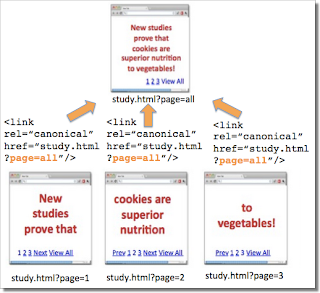SMX Sydney – Ecommerce SEO; Avoiding Common Pitfalls
It was an absolute pleasure to be a part of SMX Sydney last week, and I was fortunate enough to present on three topics one of which was ‘E-commerce SEO; Avoiding Common Pitfalls’. It’s a topic that I was really looking forward to presenting on because, being in a position where I get to see […]
The post SMX Sydney – Ecommerce SEO; Avoiding Common Pitfalls appeared first on SEOgadget.
5 common mistakes with rel=canonical
Webmaster Level: Intermediate to Advanced
Including a rel=canonical link in your webpage is a strong hint to search engines your preferred version to index among duplicate pages on the web. It’s supported by several search engines, including Yahoo!, Bing, and Google. The rel=canonical link consolidates indexing properties from the duplicates, like their inbound links, as well as specifies which URL you’d like displayed in search results. However, rel=canonical can be a bit tricky because it’s not very obvious when there’s a misconfiguration.
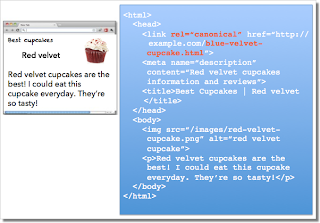
While the webmaster sees the “red velvet” page on the left in their browser, search engines notice on the webmaster’s unintended “blue velvet” rel=canonical on the right.
We recommend the following best practices for using rel=canonical:
- A large portion of the duplicate page’s content should be present on the canonical version.
- Double-check that your rel=canonical target exists (it’s not an error or “soft 404”)
- Verify the rel=canonical target doesn’t contain a noindex robots meta tag
- Make sure you’d prefer the rel=canonical URL to be displayed in search results (rather than the duplicate URL)
- Include the rel=canonical link in either the <head> of the page or the HTTP header
- Specify no more than one rel=canonical for a page. When more than one is specified, all rel=canonicals will be ignored.
One test is to imagine you don’t understand the language of the content—if you placed the duplicate side-by-side with the canonical, does a very large percentage of the words of the duplicate page appear on the canonical page? If you need to speak the language to understand that the pages are similar; for example, if they’re only topically similar but not extremely close in exact words, the canonical designation might be disregarded by search engines.
Mistake 1: rel=canonical to the first page of a paginated series
Imagine that you have an article that spans several pages:
- example.com/article?story=cupcake-news&page=1
- example.com/article?story=cupcake-news&page=2
- and so on
Specifying a rel=canonical from page 2 (or any later page) to page 1 is not correct use of rel=canonical, as these are not duplicate pages. Using rel=canonical in this instance would result in the content on pages 2 and beyond not being indexed at all.
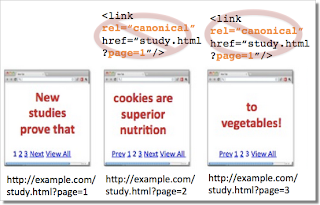
Good content (e.g., “cookies are superior nutrition” and “to vegetables”) is lost when specifying rel=canonical from component pages to the first page of a series.
In cases of paginated content, we recommend either a rel=canonical from component pages to a single-page version of the article, or to use rel=”prev” and rel=”next” pagination markup.
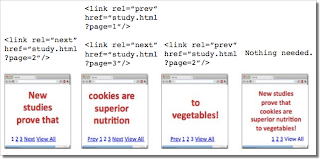
If rel=canonical to a view-all page isn’t designated, paginated content can use rel=”prev” and rel=”next” markup.
Mistake 2: Absolute URLs mistakenly written as relative URLs
The <link> tag, like many HTML tags, accepts both relative and absolute URLs. Relative URLs include a path “relative” to the current page. For example, “images/cupcake.png” means “from the current directory go to the “images” subdirectory, then to cupcake.png.” Absolute URLs specify the full path—including the scheme like http://.
Specifying <link rel=canonical href=“example.com/cupcake.html” /> (a relative URL since there’s no “http://”) implies that the desired canonical URL is http://example.com/example.com/cupcake.html even though that is almost certainly not what was intended. In these cases, our algorithms may ignore the specified rel=canonical. Ultimately this means that whatever you had hoped to accomplish with this rel=canonical will not come to fruition.
Mistake 3: Unintended or multiple declarations of rel=canonical
Occasionally, we see rel=canonical designations that we believe are unintentional. In very rare circumstances we see simple typos, but more commonly a busy webmaster copies a page template without thinking to change the target of the rel=canonical. Now the site owner’s pages specify a rel=canonical to the template author’s site.
Another issue is when pages include multiple rel=canonical links to different URLs. This happens frequently in conjunction with SEO plugins that often insert a default rel=canonical link, possibly unbeknownst to the webmaster who installed the plugin. In cases of multiple declarations of rel=canonical, Google will likely ignore all the rel=canonical hints. Any benefit that a legitimate rel=canonical might have offered will be lost.
In both these types of cases, double-checking the page’s source code will help correct the issue. Be sure to check the entire <head> section as the rel=canonical links may be spread apart.
Mistake 4: Category or landing page specifies rel=canonical to a featured article
Let’s say you run a site about desserts. Your dessert site has useful category pages like “pastry” and “gelato.” Each day the category pages feature a unique article. For instance, your pastry landing page might feature “red velvet cupcakes.” Because the “pastry” category page has nearly all the same content as the “red velvet cupcake” page, you add a rel=canonical from the category page to the featured individual article.
If we were to accept this rel=canonical, then your pastry category page would not appear in search results. That’s because the rel=canonical signals that you would prefer search engines display the canonical URL in place of the duplicate. However, if you want users to be able to find both the category page and featured article, it’s best to only have a self-referential rel=canonical on the category page, or none at all.
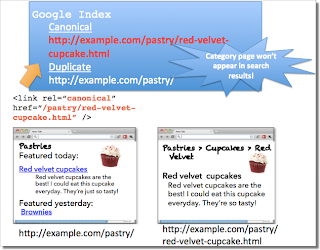
Remember that the canonical designation also implies the preferred display URL. Avoid adding a rel=canonical from a category or landing page to a featured article.
Mistake 5: rel=canonical in the <body>
The rel=canonical link tag should only appear in the <head> of an HTML document. Additionally, to avoid HTML parsing issues, it’s good to include the rel=canonical as early as possible in the <head>. When we encounter a rel=canonical designation in the <body>, it’s disregarded.
This is an easy mistake to correct. Simply double-check that your rel=canonical links are always in the <head> of your page, and as early as possible if you can.
Conclusion
To create valuable rel=canonical designations:
- Verify that most of the main text content of a duplicate page also appears in the canonical page.
- Check that rel=canonical is only specified once (if at all) and in the <head> of the page.
- Check that rel=canonical points to an existent URL with good content (i.e., not a 404, or worse, a soft 404).
- Avoid specifying rel=canonical from landing or category pages to featured articles as that will make the featured article the preferred URL in search results.
And, as always, please ask any questions in our Webmaster Help forum.
Written by Allan Scott, Software Engineer, Indexing Team
Understanding Real Company, ahem “Stuff”, DistilledLive Seattle video discussion
In the last DistilledLive video, Will and Bridget gave their thoughts on mobile sites and search. For this week’s edition however, we’re heading back to the Seattle offices to talk through a much discussed turn of phrase within the industry of late. Our Continue reading »
Does Changing Domain Name Affect SEO?
I want to address three questions that recently brought people to the SEO Theory blog. They are all connected, although the people asking the questions may not have realized that. The first question is the one that intrigued me the most. Does Changing the Domain Name Really Affect Your Search Engine Optimization? Almost anyone with three or more years’ experience in the field should know by now that, of course changing the domain name will affect your SEO. But I don’t believe that is really the question these people mean to ask. I think they are looking for answers for a question more like, “Will changing my domain name affect my rankings/search engine optimization results”? In other words, people don’t normally look at changing their domain names unless something compels them to. Maybe they have been told by The Company (or The Client) that the domain name is being changed and they have to make sure nothing bad happens. Maybe a merger has happened and an old domain is being folded into another. Maybe someone sold a domain but kept the content. So, the first thing to understand is that not all domain name swaps are the same. If you […]
The Lean Analytics Cycle: Metrics > Hypothesis > Experiment > Act
This should not be news to you. To win in business you need to follow this process: Metrics > Hypothesis > Experiment > Act. Online, offline or nonline. Yet this structure rarely exists in companies. We are far too enamored with data collection and reporting the standard metrics we love because others love them because […]
The Lean Analytics Cycle: Metrics > Hypothesis > Experiment > Act is a post from: Occam’s Razor by Avinash Kaushik
The future of SEO plugins for WordPress
I find myself becoming more and more defensive of WordPress SEO plugins, my own in particular. When people make jokes about them I tend to get angry, which is perhaps a stupid reaction, but it made me think: why would people make jokes about them, are they that stupid? What does the future hold for…
The future of SEO plugins for WordPress is a post by Joost de Valk on Yoast – Tweaking Websites.
A good WordPress blog needs good hosting, you don’t want your blog to be slow, or, even worse, down, do you? Check out my thoughts on WordPress hosting!
Category Relevant Search Results, Query Suggestions, and Advertisements Based on Location?
A couple of days ago, Mike Blumenthal of Understanding Google Places & Local Search asked a pretty timely question with the post Google Local: Are Mobile Signals Actively used in Ranking Local Results? Mike mentioned a post I wrote about Google research on using driving directions as a local search ranking signal.
Mike can […]
The post Category Relevant Search Results, Query Suggestions, and Advertisements Based on Location? appeared first on SEO by the Sea.
Penguin 2.0 Forewarning Propaganda?
Eric Enge recently published an essay entitled “Penguin 2.0 Forewarning: The Google Perspective on Links”. I know about it because Matt Cutts referred to it as a “good article”. It was about links and link building, and Google’s Penguin updates. For those who don’t know, Penguin Updates are updates Google pushes out which penalize web […]
Local Weekend Update
Several items of interest. Dates & Scores No Longer Showing on Google Reviews. Chris Campbell on Twitter and Jack Thornburg on G+ pinged me that date and scores on individual reviews on the business G+ Page had stopped showing. It had been reported on April 4th in the forums. Google has said that they are looking […]
Stolen Post – Attn: Thief
24 hours are up so I’m posting this here. This is an email I sent to the blog owner who has stolen one of my posts off this blog a while ago – since I could not reach them by …
Why Your Website Is Not Cached in Google
For people who are asking “what is the reason not to show cache of a website”, here is a brief rundown of possible explanations. Someone left the following comment a week ago. I have tried twice to send an email to the person but their mail service says the mailbox is unavailable. Normally I would leave matters at that but this question comes up from time to time so I thought I would write a brief article about it. To the original commenter, I hope you see this. Your site should be fine. This is off-topic, but I was wondering if you could lend me some of your SEO expertise. My website is not cached in google. The homepage and all inner pages are indexed, but none of them are cached. I was wondering if this affects whether my website is sent organic search engine traffic. Also, can you think of a few possible causes off the top of your head as to why my pages are not cached. My blog has some settings checked like “no archive.” I changed this and a few other settings yesterday, so I’ll have to way to see if that’s what’s going on. I […]
IATLD Ranking for a Gambling Term – How Ironic (Or Not?)
Just had a look at online casino bonus UK SERPs (the way I always do at 2 am) and saw this at #6: That’s right, the site of the International Association of Top Level Domains. Apparently it got hacked, …
Facebook Leaves Home Without The SEO
Ok I know Facebook is a big-ass brand that doesn’t need your stinking organic traffic, but if you’re going to have a big press conference about your amazing new mobile strategy, don’t you think the in-house SEO person would at least do the minimum to make sure that someone searching Google would be able to […]
The post Facebook Leaves Home Without The SEO appeared first on Local SEO Guide.
Dedicated Class “C” IP addresses for SEO
The liars and schemers in the world are costing all of us a lot of money and “happiness” every day, but get away with it because in general, good people forgive them. So the bad guys go on and on hurting others. What does this have to do with SEO? Hah! Everything.
I just spent 2 […]
Google Local: Are Mobile Signals Actively used in Ranking Local Results?
David Mihm just did a great Whiteboard Friday on the evolution of the local ranking algo. In the article he speculated about the future of local signals: And just to speculate a little bit, because I love to speculate, going forward I also think we’re going to see Google potentially integrating some offline information into […]
How to Perform Topical Keyword Research
The foundation to any successful online marketing strategy – content, social, or search – is keyword research. Without it, how will you know what to target and base your campaigns around? Fortunately, it’s not that difficult to do. In this post, we’re going to look at how you can perform keyword research to find the […]
The post How to Perform Topical Keyword Research appeared first on SEOgadget.
NoFollow, Wherefore Art Thou NoFollow?
Ah, “rel=’nofollow’”. How the SEO community loves and hates thee. I would count the ways but frankly I would die of boredom long before I reached the middle of the list. Nonetheless, it seems we cannot seem to divorce ourselves from discussion of the tiniest of link attributes, this mere trinket of self-deception and self-abuse. Why is it that people in our industry cannot get the facts straight about NoFollow? Why is it so hard to agree in one voice on what NoFollow is or is not? I have no idea and I’m not going to waste my time trying to figure that out, but here are a few of the latest misconceptions about “rel=’nofollow’” that are making the rounds. I provide them in no particular order. Come, gentlemen, I hope we shall drink down all unkindness. Matt Cutts, I will buy you and your wife a vacation in Hawaii if you can show me scientific evidence that putting “rel=’nofollow’” on a link discloses anything at all about the purpose or nature of the link. How in the hell is “NOFOLLOW” supposed to say “I’m a freaking paid link” as opposed to “I’m a link where I don’t want to […]
Google Patent Granted on Fresh Related Search Suggestions
When you search at Google, in addition to search results, Google often returns a set of search suggestions that might be related to your query. Last month, I wrote about how some of those suggested query refinements might be created follow a method inv…
11 Things My Son Taught Me about Life & Business
Yesterday I came across the Complete Guide to Not Giving a Fuck by Julien. I found myself nodding in agreement with each point he made. These were lessons I learned long ago thanks to the most courageous person I’ve ever known – my son CJ. He’s been gone for four months now. But the impact […]
The post 11 Things My Son Taught Me about Life & Business appeared first on Sugarrae.
Tracking Mobile Visitors in Google Analytics: A Checklist Guide for Mobile Insights
It is hardly surprising that “mobile” is becoming such a hot topic among digital marketers: comScore reported that in August 2012, 13% of total internet pageviews (roughly 1 in 8!) were from mobile devices (phones and tablets combined). And these numbers Continue reading »
